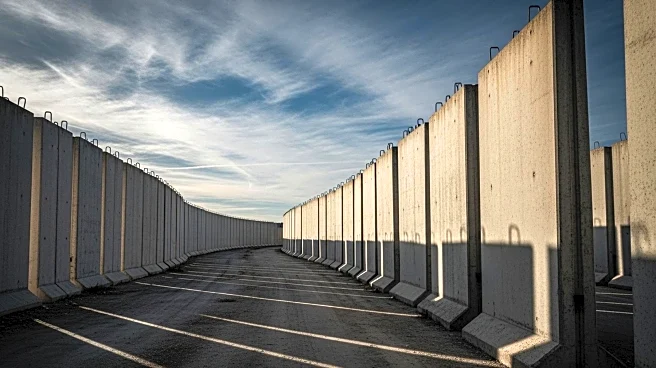What's Happening?
The Rapid Support Forces (RSF) have constructed an extensive earthen barrier around the Sudanese city of El Fasher, according to Yale University's Humanitarian Research Lab. This development is part of a strategy to isolate the city, which has been under siege for over a year. The RSF's actions have led to severe humanitarian conditions, including bombardment, food shortages, and limited access to medical care. The RSF's control over El Fasher would mean full control of the western Darfur region, potentially leading to further partitioning of Sudan. The construction of the barrier has deepened siege conditions, complicating efforts for civilians to flee or for humanitarian aid to reach the city.
Why It's Important?
The construction of the barrier around El Fasher by the RSF has significant implications for the humanitarian situation in Sudan. The isolation of the city exacerbates the already dire conditions faced by civilians, including food scarcity and medical care shortages. The RSF's control over El Fasher could lead to further partitioning of Sudan, affecting regional stability and potentially leading to increased violence. The international community may face challenges in providing humanitarian aid and addressing the human rights violations occurring in the region.
What's Next?
The ongoing construction of the barrier suggests that the RSF is preparing for a prolonged siege of El Fasher. Humanitarian organizations may continue to face difficulties in accessing the city, and civilians may struggle to escape the worsening conditions. The international community may need to increase diplomatic efforts to address the crisis and provide support to affected civilians. Observers warn that the fall of El Fasher could lead to further partitioning of Sudan, necessitating increased attention from global leaders.
Beyond the Headlines
The RSF's actions in El Fasher highlight the complex ethnic and political dynamics in Sudan. The targeting of non-Arab ethnic groups by RSF fighters and allied militias raises concerns about ethnic cleansing and human rights violations. The construction of the barrier may also have long-term implications for the region's political landscape, potentially leading to shifts in power and governance. The international community may need to consider the ethical and legal dimensions of the crisis and explore avenues for intervention.











